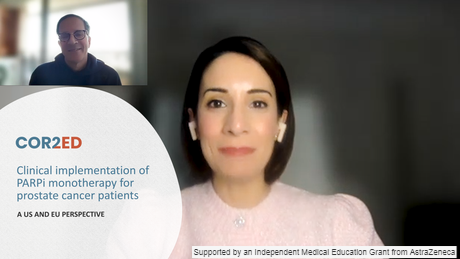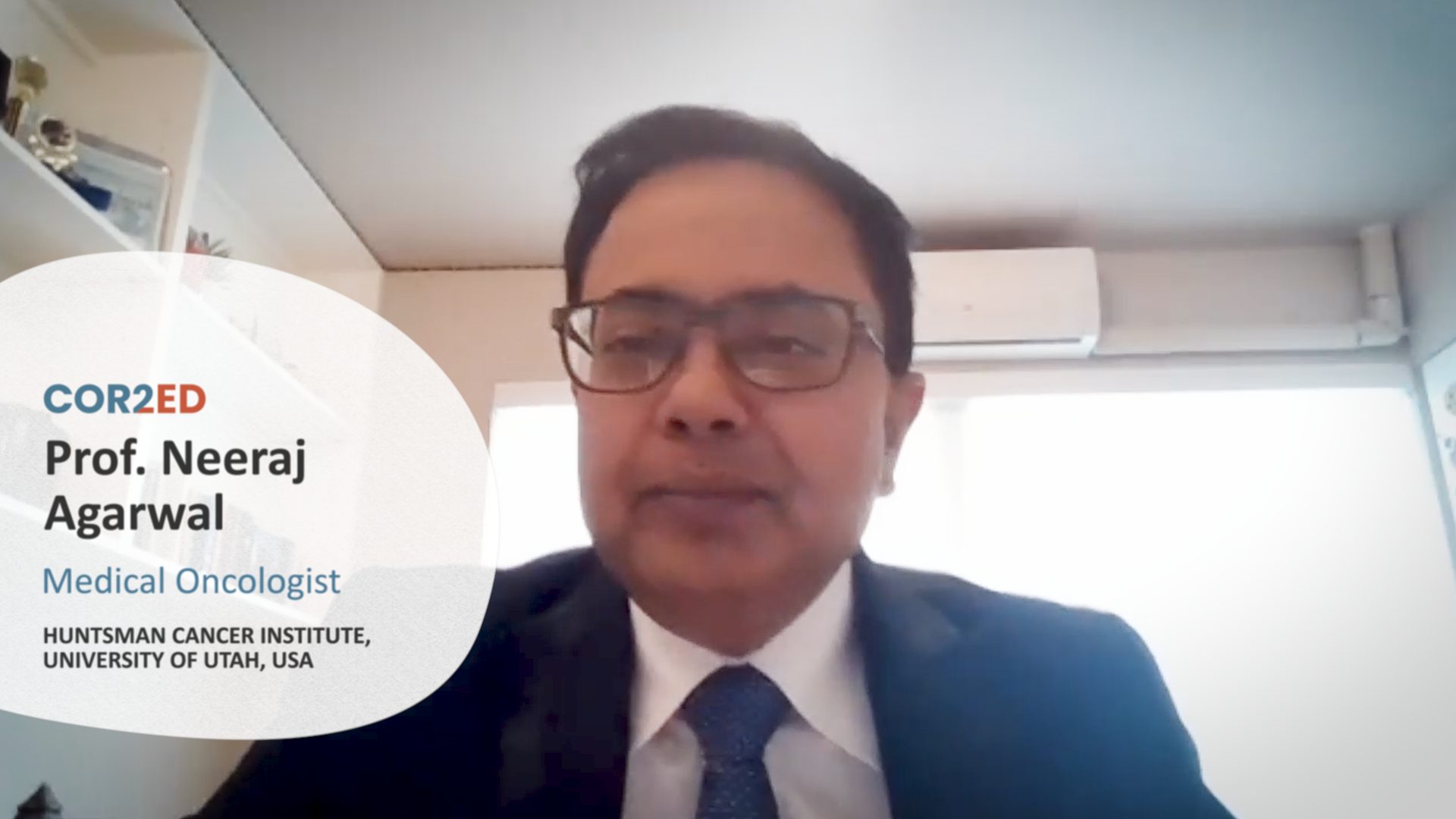Episode 1: Clinical implementation of PARPi monotherapy for prostate cancer patients – a US and EU perspective
Transcript
Welcome and thank you for listening to this podcast from COR2ED independent medical education. In this episode, you will hear from internationally renowned experts Dr Elena Castro and Dr Neal Shore how they implement PARP inhibitor monotherapy in clinical practice for their prostate cancer patients. They discuss whether all PARP inhibitors are the same or different, when to initiate a PARP inhibitor as well as the relevance of genetic testing and various gene alterations on treatment decisions.
This podcast is an initiative of COR2ED and developed by GU CONNECT, which is a group of international experts working in the field of GU Oncology. The podcast is supported by an independent educational grant from AstraZeneca. The views expressed are the personal opinions of the experts and they do not necessarily represent the views of the experts' organisations, or the rest of the GU CONNECT group. For experts disclosures on any conflict of interest please visit the COR2ED website. Now with that being said let’s get started.
Neal Shore
Hi everyone and welcome to our first broadcast in our series covering PARP inhibitors for prostate cancer. Today we're going to discuss the clinical implementation of PARP inhibitors as monotherapy for prostate cancer patients.
I'm Neal Shore. I'm the Chief Medical Officer for urology and surgical oncology with GenesisCare in the U.S. and the Director of Carolina Urologic Research Center. I’m really happy and delighted to be joined today by my good friend and colleague Dr Elena Castro and I’ll let Elena introduce herself. Thank you.
Elena Castro
Hi, Neal. It's a pleasure to be here with you today. I'm Elena Castro. I'm a medical oncologist at Hospital Universitario 12 de Octubre in Madrid, Spain. I treat mostly patients with advanced prostate cancer and my research is focused in prostate cancer and cancer genetics.
Neal Shore
Fantastic. Well, why are we talking about PARP inhibitors? Well, clearly, with patients with prostate cancer, we've had great progress over the last decade and a half. It wasn't until 2004 that we had our first mechanism of action in taxanes. And now if you fast forward from 2004 to 2023, we now actually have seven distinct novel mechanisms of action to offer patients with prostate cancer. And what we're going to talk about today is PARP inhibitors and PARP inhibitor in terms of a monotherapy for our patients with resistant disease, have now been available for nearly three years. We have two approved treatments that really were approved almost within 48 hours of each other by FDA. And that is olaparib, which was based on data from the global phase three trial known as PROFOUND as well as rucaparib from a very significant phase two study known as the TRITON-2, and that received an accelerated approval in the US.
The PROFOUND trial led to both FDA and EMA, a level one evidence approval, for patients with resistant disease. There are some nuance differences regarding the product information indications in Europe and in the US, so for example olaparib in US is approved for patients with mCRPC and homologous recombinant repair mutations who have progressed on either enzalutamide or abiraterone acetate. Classically, what we refer to as androgen receptor targeted agents or antigen receptor blockers or novel hormonal agents. In the EU, olaparib is indicated for monotherapy for patients who are only have the BRCA mutation, so B2/B1 who've also progressed on a novel hormonal agent or an ARTA as we sometimes call it.
In the US there are 14 gene alterations within the family of HRR that have FDA approval. So, there's a distinctive difference.
Now rucaparib is a US only approved based upon the TRITON-2. We're going to talk about the TRITON-3 today in a second and have Elena address that. It has an accelerated approval based upon the TRITON-2 phase two study and it's approved for BRCA mutated patients only. So B2/B1 who've progressed on an AR directed therapy and a taxane. So that makes it also, its inclusion for approval a little bit more involved than the olaparib indication.
So, we have now seen a lot of excitement, the TRITON-3 data that was presented at the Prostate Cancer Foundation this fall, 2022, this is the confirmatory phase three trial for rucaparib. And so I think that's was really exciting. I think we're going to hear some additional data coming forward at GU ASCO as well. So maybe... let me stop here, Elena, and ask you to comment on TRITON-3 and how that may further inform our colleagues, but also anything you want to comment as well on the PROFOUND trial and the olaparib approval.
Elena Castro
As you said, there is a difference in the approval of olaparib by FDA and by the EMA, basically based on perhaps lack of enough evidence to treat patients with alterations other than BRCA1 and BRCA2 because these alterations are less frequent. So, the number of patients that were included in PROFOUND was smaller than for BRCA, and it isn't clear at this time whether these patients may also
benefit from treatment with PARP inhibitors. This is why I think it's so relevant, TRITON-3 and other trials that will help us understand the real predictive value of other alterations, not only BRCA1 and BRCA2.
And the TRITON-3 is a phase three randomised trial that included only patients with alterations in BRCA1, BRCA2 and ATM. These were mCRPC patients who had already progressed to treatment with an hormonal agent, abiraterone or enzalutamide. And these patients were randomised to receive either rucaparib or the physician's choice that could include docetaxel or the hormonal agent that they have not received previously, so either abiraterone or enzalutamide.
So, this is the first time that a PARP inhibitor has been compared with docetaxel and I think it is very relevant because what we see is 50% reduction in radiographic progression-free survival for patients with BRCA alterations with rucaparib compared to the physician's choice and for patients with ATM alterations, the benefit is only 5%.
So, I think this is very important because in PROFOUND, to be eligible patients had to have progressed only to a hormonal agent, most of them, about 65% of them, had also received a taxane before entering the trial. So, the TRITON-3 trial tells us that perhaps for patients with BRCA alterations, it will be better to treat with rucaparib rather than waiting until they progress to treatment with a taxane. So early treatment for these patients may really improve their outcomes. Of course, we still don't have overall survival data, but the difference in rPFS is really significant for these patients.
What I don't know is whether this benefit that we observe with rucaparib could also be extrapolated to other PARP inhibitors. I don't know. Neal, what do you think?
Neal Shore
Yeah, that's a great question and gets asked so often. And one of the challenges is the low prevalence of some of the 14 HRR mutations that we see listed by the product information in the US for the approval of olaparib. I think that of those 14, originally 15 in the PROFOUND trial but 14 were accepted, we have had, at least I have had anecdotally, and I think many of our colleagues, some very good responses with PALB2, the RAD51 subsets, certainly ATM, as was noted in the TRITON-3 here and even to some degree also in PROFOUND, the CDK12, CHEK2.
Some of the alterations, they're not high in prevalence, but we don't always see great responses. You know, that said, and I'm a big proponent of using taxanes, docetaxel and cabazitaxel, but overall there's always something more appealing I think for many clinicians and certainly for patients when they can have an oral option as opposed to going to a parenteral option. And again, I think taxanes by and large have become better managed. I think that even though we do see grade 3/4 toxicities, they can be very well managed and clearly effective therapies.
So that is a little bit of a conundrum right now, I think, in terms of the product information acceptability in Europe versus the US. I'm curious what you think about that, Elena, for the patients who are, for example, the RAD51’s, the PALB2’s. But then also there's clinical trials that we're working on for ATM selectivity, there's some IO or pembrolizumab data supporting the use of it in CDK12. I wonder how you think about that?
Elena Castro
Well, with regards to the predictive value of some of the HRR alterations, I think for ATM we have now enough evidence suggesting that a PARP inhibitor in monotherapy perhaps is not the best option for these patients, as a group it is true, as you mentioned, that some individuals seem to benefit from this and we need to understand better which is the type of ATM alteration that is associated with a benefit from a PARP inhibitor but it doesn't seem to be an ATM mutation as could be the case for BRCA2 for instance. For PALB2, these are infrequent alterations, rare alterations and we are slowly getting data from different series and trials and it seems that these patients may benefit significantly from PARP inhibitors. For other, less frequent alterations, still we have to wait. But as you say, there are some of these alterations that seem really to predict a benefit from PARP inhibitors.
Neal Shore
Yeah, I totally agree, and the ATM of all those 14 gene alterations after BRCA2 and CDK12, it actually has a high prevalence and I think it's a big unmet need. One of the things I'm curious about Elena and maybe you can weigh in on this, is patient comes to you and their BRCA alteration, whether it's 1 or 2, maybe there's a difference in your mind thought, accessibility is not an issue, they're mCRPC. And now they either didn't tolerate or they progressed after abi (abiraterone) or enza (enzalutamide), and assuming you have rucaparib at your disposal, it's approved and you have olaparib and you could use docetaxel. How do you frame that for patients? How do you have that discussion with them in the clinic?
Elena Castro
Well, for patients with BRCA alterations, particularly for BRCA2, I will say that we have the possibility of using a therapy that seems to work particularly well in patients with this type of alteration. Well, of course, we still need to wait until we have the approval for patients who have received chemotherapy, for rucaparib. But I will say that it seems that with the data of TRITON-3 study, patients with these type of alterations may get better outcomes when treated with a PARP inhibitor as soon as possible.
It is an oral medication, of course, but we still need to monitor the blood counts carefully because it is still has some toxicities that we may be able to prevent or to manage. And we are aware that eventually the tumour may become resistant to this treatment and we still may have to use chemotherapy in a later stage. For a BRCA patient I would like to try a PARP inhibitor as soon as possible.
Neal Shore
Yeah, I fully agree with that. I think what we're going to see fairly soon based upon the TRITON3 data, prior TRITON2, but of course the excellent data from PROFOUND, if you have the luxury or what's sometimes called an embarrassment of riches, you have the opportunity to choose amongst two approved, who knows maybe with time we'll have even three and four different PARP inhibitors approved based upon some additional studies. Many of our colleagues are probably wondering, are all PARP inhibitors the same? And particularly, do you think we'll start to delineate differences in subtle differences or even more significant differences in toxicity? Clearly the myelosuppression, you have to check a CBC monthly for patients on a PARP inhibitor.
Will there be differences in terms of that myelosuppression? Variances between RBC, WBC, platelet counts and then maybe Elena, you can also comment on that first part question and then also on any GI side effects?
Elena Castro
Yes, the most frequent side effects are anaemia and with some of them thrombocytopenia has been more frequently observed with talazoparib than with other agents. And gastrointestinal toxicity, mostly nausea up to about 15-20% of patients can refer grade 2, up to grade 1/grade 2 nausea. There is not a big difference between PARP inhibitors in terms of toxicities. In all the trials these have been quite consistent with the different agents. We don't have any trial with a direct comparison of the different agents, so we don't know whether there is a different efficacy when we use these agents in monotherapy. What we know from pre-clinical trials and early trials is that it is true that the potency of the agents is different and it may be important, whether due to toxicities or other issues, we may have to reduce the dose to improve tolerability with a PARP inhibitor. So yes, there may be some differences between agents.
Neal Shore
Yeah, I agree with all of that. And maybe just in closing, and I know it's a big topic to cover and you've done an amazing amount of work on this. It's just the whole notion still around testing. When should our uro-oncology colleagues, our medical oncology colleagues be testing our patients with prostate cancer? Maybe just some top-line views regarding the use of germline and somatic testing. And somatic, of course, has the nuances of tissue versus, you know, liquid-based testing.
Elena Castro
Yes, the alterations in BRCA1 and BRCA2 seems to be early events that are already present in the primary tumour. So, we could detect it from diagnosis. But from a practical point of view, just to test in those patients that will be eligible for a PARP inhibitor. Also taking into consideration that the test may take some time, that we may have to repeat the test or acquire a new tumour sample.
I will say that a good idea will be to start considering testing when the patient is progressing to the previous hormonal agent. For instance, when the PSA starts to go up. That will allow us to liaise with all the struggles of testing. For the purpose of a PARP inhibitor, I will test the tumour or I will proceed with circulating DNA analysis, a plasma analysis. And because in prostate cancer, HRR alterations are more prevalent in the tumour than they are in the germline.
If we do identify an HRR alteration in the tumour, then we should proceed with germline testing to exclude that that alteration is indeed germline. With this procedure, we may only miss about 7% of the germline alterations. There are some germline alterations that we may not be able to detect in the tumour. So, my advice is that if you have a patient that for whatever reason you suspect that could be a germline carrier, because of their family history, because of the presentation of the disease, and you do not identify anything in the tumour. It doesn't matter, refer the patients for germline testing.
The reason why we do germline testing is to identify families who may be at risk of not only prostate cancer, but also other types, other cancer types. So, yes, it is important to take into consideration both aspects. The possibility of a targeted therapy and also the possibility of early detection of cancer or even prevention.
Neal Shore
Well, that was great. That was really well said and super, super important for all of our colleagues who treat patients with advanced prostate cancer to understand that the absolute key indication to get both germline testing when it's appropriate, almost virtually universal now for patients with advanced prostate cancer, even localised prostate cancer with significant family histories. And then the somatic based or the tumour-based testing, as you say, there's tissue, there's liquid-based ways to optimise. And why it's so important, because now we have novel mechanism of action in the form of a PARP inhibitor to complement taxanes, to complement our androgen receptor targeted agents, to complement radiopharmaceuticals and other immunotherapies. So very, very important. I think you summarised that as expertly as you always do.
So with that, Elena, thank you so much. It's been a great pleasure to work with you on this podcast.
Elena Castro
Thank you, Neal. See you in our next podcast.
We hope you found this podcast informative and enjoyable. If you liked this episode, you should look on the COR2ED channel for more! In particular, look out for another podcast with experts Dr Castro and Dr Shore, where they discuss how combination therapy of PARP inhibitors and novel hormonal agents could be implemented into their clinical practice for prostate cancer patients. Make sure to listen to that one too.
Also, don’t forget to rate this episode on the COR2ED website and share our podcast on social media or with your colleagues. Thank you for again listening and see you next time!











 Downloadable
Downloadable  5 MIN
5 MIN
 Jun 2025
Jun 2025 






